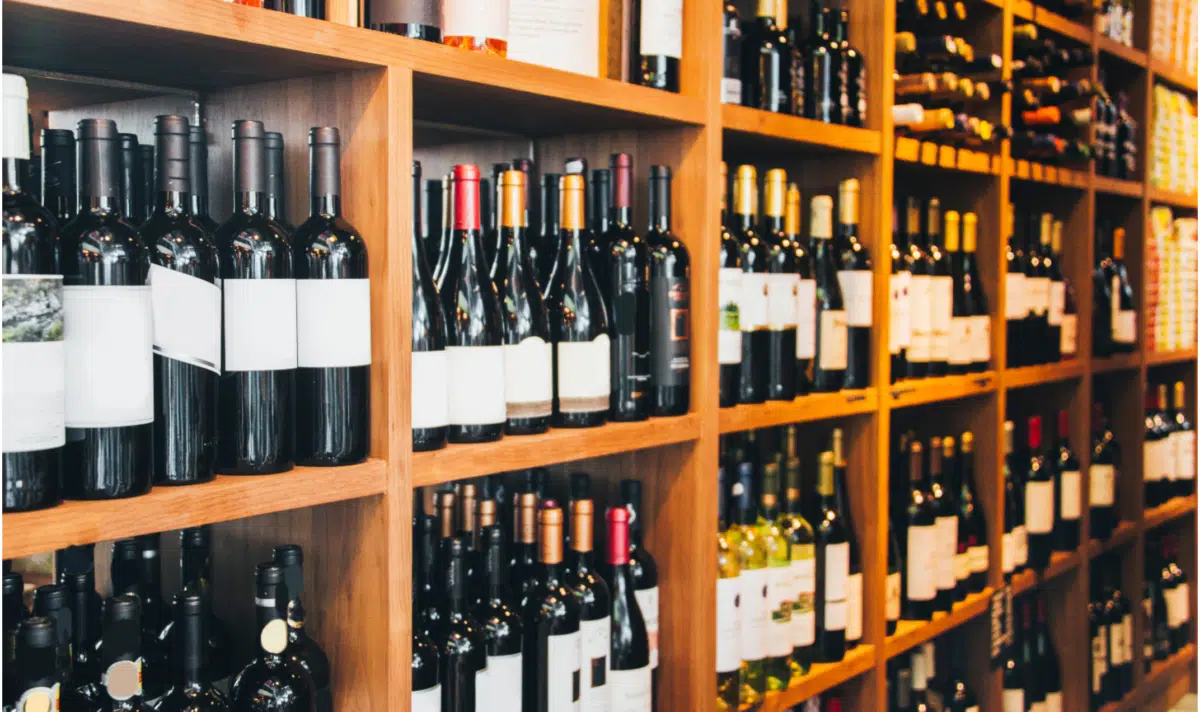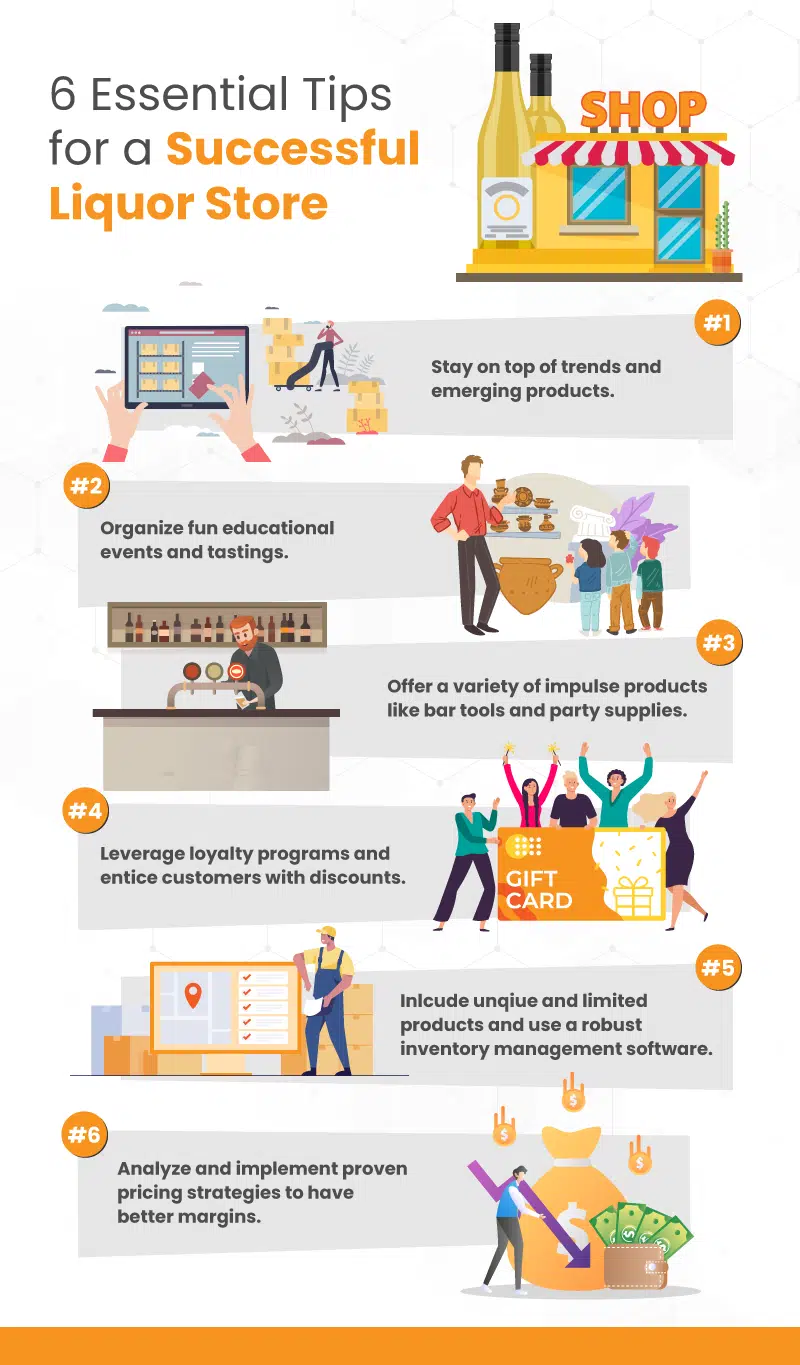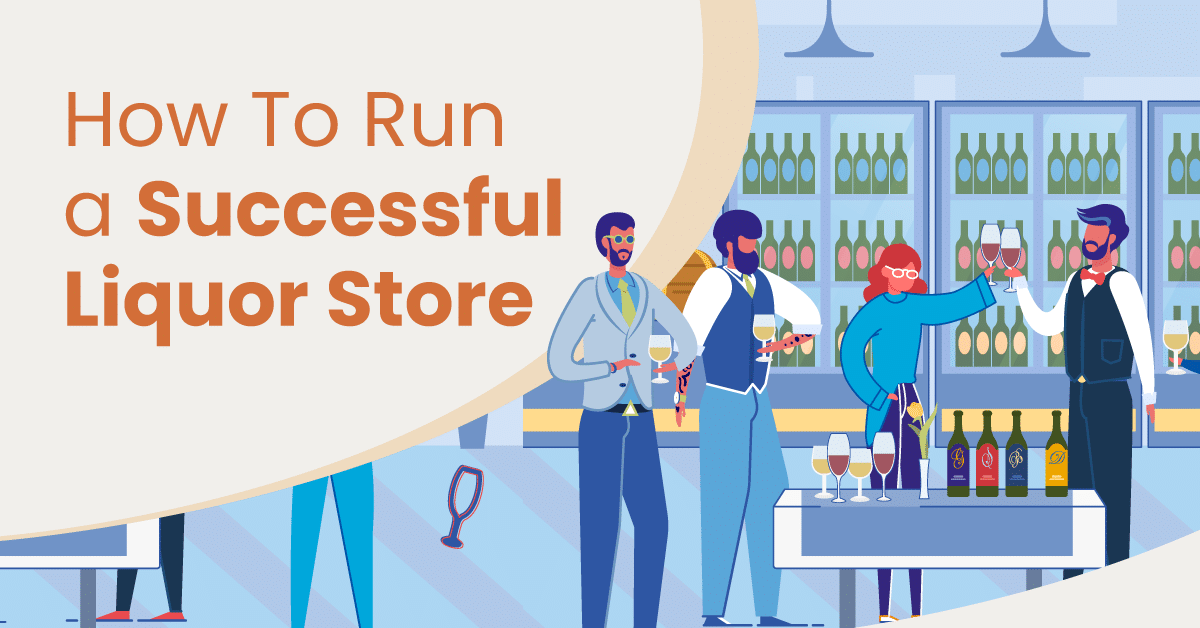
The alcoholic beverages market revenue is expected to reach $1.484 billion USD by 2022. And the market is expected to grow at an annual rate of 10.01%. However, market research regarding liquor stores is notoriously contradictory. On the one hand, they are considered a dangerous purchase, as their start-up and operating costs are high due to large inventory levels. On the other hand, liquor stores are considered one of the most recession-proof businesses due to the constant demand for products.
Either way, running a liquor store effectively is no small task. It involves more than just stocking liquor and installing a store sign and a cash register. Not only do you have to keep up with the latest trends in beverages, but you also have to comply with the regulations regarding the sale of alcohol in your state. Read this article to learn more about running a successful liquor store.

Six Essential Tips For Running A Liquor Store
Stay on top of trends
Running a liquor store is first about knowing what your customers want. So staying on top of trends means listening to your customers, maintaining good relationships with suppliers, and anticipating what products will be in demand.
In 2022, some of the most popular beverages sold at liquor stores were actually non-alcoholic and low-alcohol. Non-alcoholic and low-alcohol beverages are becoming more prevalent, driven by a growing desire for sobriety among younger consumers as well as modern social media advertising. Health-focused fermented drinks, cannabis-infused drinks, non-alcoholic wines, and low-alcohol liquor are all newer types of beverages that all liquor stores need to carry.
Of course, it’s still important to keep the real stuff. There are emerging products with normal alcohol content, such as hard seltzers, canned wines and cocktails, large-batch cocktail kits, and more.
Organize informative events and tastings
People love to learn about fun concepts like crafting creative flavor combinations or learning how spirits are produced. Hosting a tasting is a great way to bring in customers and market your business. You can also run promotions at these events to increase sales. This is an opportunity for you to introduce more people to your products.
Before organizing any tasting event, you must know your audience well. Choose a theme for your tasting, then give your audience some tips on tasting. For any tasting event, the order of tasting is recommended to be from lowest to highest alcohol content. This helps reduce alcohol fatigue and avoid overloading your participants’ sensory abilities too quickly.
Offer a selection of impulse products
Liquor store impulse buying is the tendency of a customer to purchase goods and services without prior planning. When a customer makes such spur-of-the-moment purchasing decisions, they are usually triggered by emotions.
These products can include store merchandise, party supplies, soft drinks and mixers, bar materials and tools, and more. Try incorporating these items into holiday promotions. Finally, Placing these items near cash registers is an easy way to move high-margin products and improve your bottom line.
Leverage loyalty clubs
A liquor store loyalty program is an alcohol marketing strategy designed to attract customers. Customers are enticed to spend through incentives, discounts, or rewards. There are various loyalty programs, but a points program is the most effective for a liquor store. Spirits lovers will be more than happy to sign up for loyalty clubs. Just be sure to make the membership program easy for customers to sign up in-store and online.
Include unique items in your inventory and leverage inventory management software
Set yourself apart from the competition by offering unique products so customers can discover new brands and flavors. Start by asking suppliers about some of their lesser-known products and order a small batch to start. Showcase new liquors at informational events and tastings. Running a successful liquor store also means having perfect control over liquor inventory management. Liquor store owners or managers have hundreds of SKUs to manage. Inventory management software features track the suppliers of each product to comply with certain regulations.
In addition to liquor inventory management tools, you need the best POS liquor store to manage customer information, such as contact information and purchase history, so stores can reward their most valuable visitors with attractive perks. The liquor store manager or owner has many other points of sale features, such as the ability to scan IDs, auditing to prevent theft and loss, and controlling price management.
Leverage proven pricing strategies
If you want to add a new product to your shelves, you will need to analyze the market supply and demand for that category as well as the perceived value of that product. If you price your items too high, you may lose customers; if you price too low, you may reduce your profits. Make sure you have suppliers who sell you drinks at convenient products, i.e., that allow you to have better margins when sold at retail.
Why Liquor Store Ownership is Profitable
1. Low Competition
The 21st Amendment gives each state the authority to regulate the distribution, importation, and sale of alcohol within its borders. While each state handles this differently, it is common for states to limit the number of liquor stores per area. For example, Florida limits their licenses by population. Obtaining a liquor license in Texas, however, is much more open and available.
For consumers, this limits their access to alcohol, but for store owners, it means less competition in your area. Applying for and obtaining a liquor license can be difficult. Still, once you get the green light to sell alcohol, you won’t have to worry about as many competitors entering your territory.
2. Free advertising
Beer, wine, and spirits producers spend millions on advertising campaigns to drive product exposure and sales. Meanwhile, liquor store owners can reap the benefits of these pre-existing advertising campaigns without spending a dime.
Better yet, if a customer walks into your store due to a liquor ad but decides they prefer one brand of vodka over another, you still have the option to sell them the bottle of their choice. The only thing you have to do is to make sure people know about your store. This can be as simple as creating a website and beefing up your marketing strategies, especially your online presence. Just be sure to find out what the regulations are in your state before you have a website up and running.
Ask us at KORONA POS about our mapAds integration. This tool allows liquor stores to have their entire inventory listed on Google for free. This means that users making local searches for alcohol are far more likely to see your store and products. Plus, you have the option to run paid ad campaigns through YouTube, Instagram, or Facebook if you opt to do so.
3. No worries about spoilage
While grocery stores and restaurants need to use or sell their inventory before it deteriorates, liquor and wine, on the other hand, can be safely stored for a long time. There may be times when you need to ensure that certain products are stored in the right weather conditions, but overall, your inventory can stay on the shelf without the risk of spoilage. This is a tremendous advantage for liquor store owners because they don’t have to worry much about dead stock.
Shelf stability also allows liquor retailers to plan ahead and keep many products in stock. You can stock up on popular winter products during the summer when you have more cash on hand, and out-of-season inventory is cheaper. For example, peppermint schnapps can be stocked year-round and will be ready to sell for the holidays without affecting the taste or quality of the product.
Staying ahead of consumers is a battle most business owners face, which requires industry and consumer research on your part. Making sure your store aligns with popular consumer preferences is a great way to run a successful liquor store.
With convenience becoming increasingly important to most consumers, your liquor store could benefit from joining online food ordering and delivery platforms. This saves the consumer time while still purchasing products from you. KORONA Liquor store POS integrates with Bottlecapps and CityHive to help liquor retailers sell more through delivery and online ordering. Click on the button below for a demo with one of our product specialists on how KORONA POS can benefit your business.
FAQs: How To Run a Successful Liquor Store
The day-to-day operations of a liquor store include numerous cash transactions, discussions with customers about beverages, constant inventory monitoring, and long working hours. The owner must be willing to take an active role in the day-to-day operations.
Running a successful liquor store requires that you stay on top of trends, offer unique products, organize events and tastings, create a loyalty club, offer a selection of unique products, and encourage impulse purchases. Most importantly, it is essential to comply with the various regulations regarding the sale of alcoholic products in your state so as not to lose your license.
Stocking the shelves with a good selection of beer, wine, and spirits can cost around $35,000 or more. In addition, any retail space you find will require some preparation. Simply adding shelving to store and display inventory can be expensive and cost upwards of $20,000.











